Art Against Knives launch urgent appeal to keep their youth space open [@ArtAgainstKnive]
![Art Against Knives launch urgent appeal to keep their youth space open [@ArtAgainstKnive]](https://guap.co/wp-content/uploads/2021/11/Art-Against-Knives-Spacehive-Poster-1-180x180.png)
Young people themselves corroborate that the early intervention offered by organisations such as Art Against Knives is critical.
Art Against Knives youth space in North London is at risk of closing. It provides over 400 young people a year with a place to imagine, learn & create their own positive futures, free from violence. Franklyn Addo reflects on how he became a part of the Art Against Knives community and how it changed his life.
Contribution by Franklyn Addo.
It may seem cliché or at least hyperbolic to claim that art saved my life. Yet growing up in relative deprivation amidst the high levels of crime that characterised Hackney before its more recent gentrification, it was precisely creativity that helped me to imagine beyond the immediate realities I was daily confronted with.
First, it was literature. As an adolescent, the library became a haven for me. At the very least, it was somewhere to go; it offered something to do after school rather than heading directly home or loitering outdoors. I still have fond, formative memories of my friends and me being kicked out of libraries by security for being mischievous. True, our priority back then was more likely to fraternize with students from local girls’ schools than it was to study or complete homework. In hindsight, however, the library space served a crucial role in sheltering us from the elements as well as from the dangers we knew all too well to exist in our community.
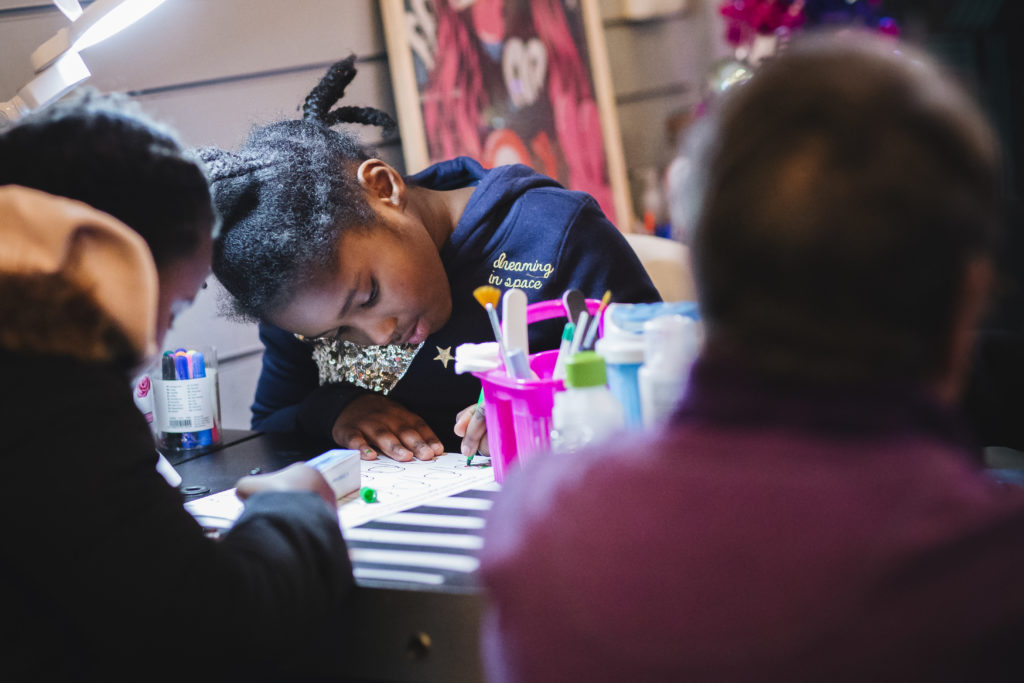
For instance, I was from very early on painfully aware of violent incidents like the 2004 killing of 16-year-old Robert Levy, who was stabbed as he tried to mediate an argument between young people. From the vantage point of the first floor of Hackney Library, whose windows I would spend a lot of time gazing through over the years to follow, the site of this tragedy can be seen. Indeed, a significant part of my secondary school experience, which started in September of the same year, was sullied by such incidents of youth violence and negative encounters with the police.
This is the context that led reading to become so therapeutic for me. With English as my favourite subject in school, I wholeheartedly embraced literature, avidly consuming books as a form of escapism. The stories I read transported me to other worlds, broadened my perspective, challenged my assumptions, and ultimately, inspired me to tell my own. I often reflect on the possibility that the time I spent indoors reading and writing spared me from some of the trouble I’d otherwise have been getting into.
After literature came the music. Growing up in East London around the turn of the millennium made me a child of the Grime generation. MCs like Kano were for us more sacred than Shakespeare. Unlike the caricature of the genre as violent and thoughtless, songs like Nobody Don’t Dance No More in fact promoted joy and festivity, while others such as Signs in Life provided sound advice for us inner-city youth, warning against the consequences of criminality. It was something of a rite of passage for me to immerse myself in Grime culture, obsessively downloading new tracks on Limewire and tuning into Channel U on Sky TV to watch the latest music videos. The words of artists stuck with me as guides throughout early life, stimulating thought and assisting me to make sense of myself in relation to the society I was surrounded by.
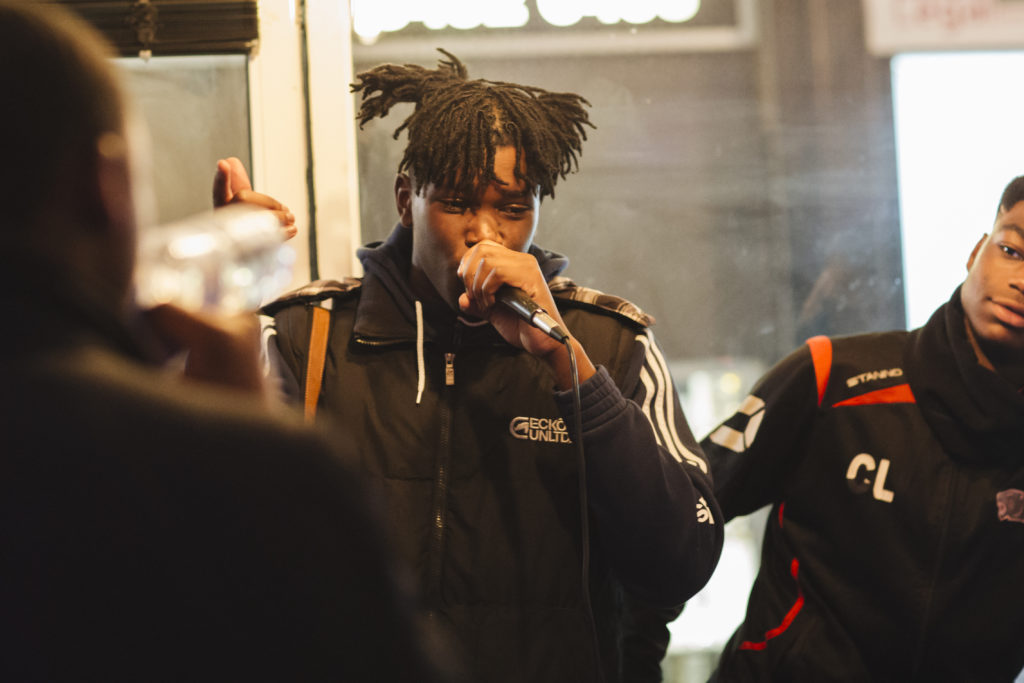
When I turned my hand to making my own music, I was offered free studio time as well as mentorship by an older artist I’d met in my community. This generous sacrificing of time and intergenerational sharing of expertise proved pivotal for me. Having a constructive outlet for my energy was invaluable; expressing myself through creativity helped me to process and regulate my emotions and cope with life’s challenges. Through their relentless support and cultivation of a safe space in which I could sensitively explore issues from the violence I observed in my community to healthy relationships, it was clear to me that my mentor was concerned not only with my creative endeavours but my overall wellbeing. That the practical skills I developed during this period still inform my career is but a welcome byproduct.
Compared to when I was growing up in the mid-noughties, there are even fewer accessible places today where young people can regularly visit, safely congregate, and be nurtured. Between 2010 and 2019 for instance, government expenditure on youth services was cut in real terms by at least 60% in every region in England, with 750 youth centres being lost. Despite this bleak context, there remain examples of impactful work being done to support young people through these ever-precarious times.
Particularly inspiring for me given my personal biography are organisations that recognise the transformative power of creativity and leverage it in their approach. Young Urban Arts Foundation for example place mobile music studios on council estates across London. One of the RoadWorks’ programmes teaches young people philosophical and sociological concepts through the lyricism of drill music and its adjacent genres, while another directly funds the creation of new work. HighRise theatre provides an infrastructure to empower young people to explore their stories and the issues affecting them on stage.
Another such organisation is Art Against Knives (AAK), which recently reached the milestone of operating for ten years coproducing community-rooted programmes with young people, harnessing creativity to prevent violence. Officially registered in 2011 following the life-changing stabbing of Oliver Hemsley a few years prior, Art Against Knives seeks to actively listen to and foreground the voices and experiences of young people to address the root causes of violent crime in marginalised communities.
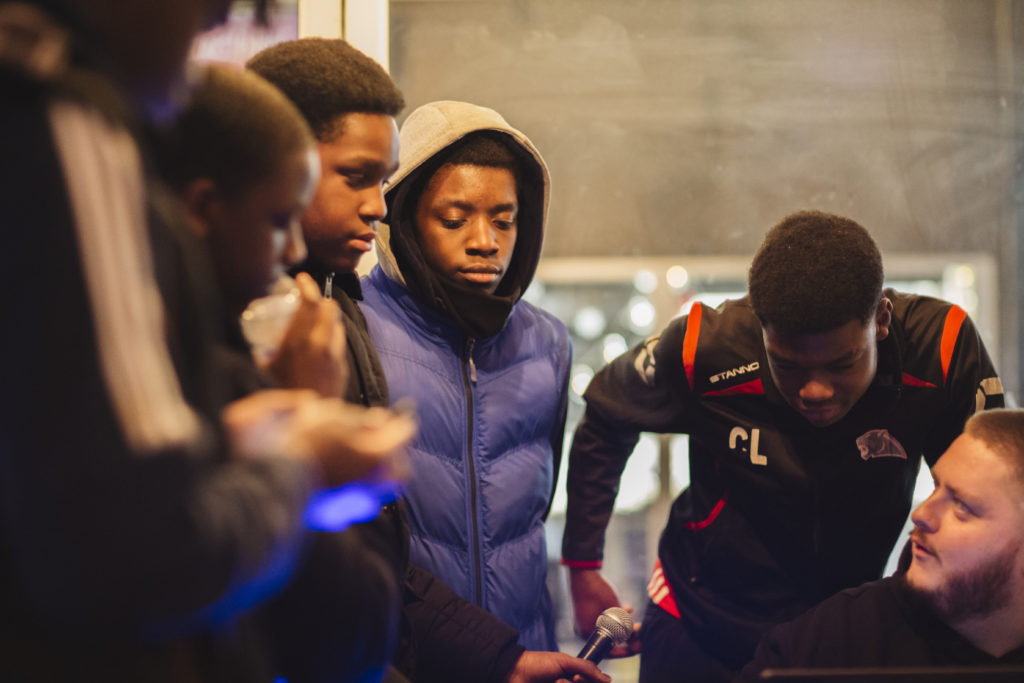
A feeling of fondness and familiarity filled the room at Art Against Knives’ tenth birthday celebration, held in the premises of a grassroots football club in Barnet. “It’s like our own little family”, one young person described. This theme of kinship would recurrently arise in conversation with both service users and staff. Such a warm, inclusive environment can afford young people a crucial sense of belonging for which some, unfortunately, turn to unhealthier associations like violent relationships or gang membership. It’s no surprise then that the young people at Art Against Knives attend willingly and with enthusiasm; many of those I spoke with shared that they had been in some way connected to the organisation for at least a few years.
Indeed, alongside listening and co-production on the list of principles that inform Art Against Knives’ approach is consistency. That their creative spaces are open 48 weeks in the year means that the young people know that they can reliably access them, which inspires the regular attendance that enables trusted relationships to form. Such long term engagement is heartening considering the knowledge that years of cumulative trauma for instance cannot be healed within but a few weeks of intervention. This sustained delivery and careful fostering of mentoring relationships, as well as a welcoming, non-judgmental culture, encourages young people to feel free to share anything which may be of concern to them.
Art Against Knives employs and embeds specialists into their creative spaces who are equipped to effectively respond to any such disclosures. For instance, the Vales Nails, NW9 Nails, and Dollis Dolli’s nail bars (which together comprise the organisation’s ‘In Our Hands’ programme) have Independent Domestic Violence Advisors as an integral part of their teams. Open once each week on Tuesdays through Thursdays, these boutiques are named after the North London estates they’re based upon and provide free nail painting for young people as well as a wide range of other arts-based activities to partake in. The conversation that organically ensues during the nail painting provides a unique opportunity for engagement; the intimacy and embodied nature of the process have led some to feel safe enough to bravely come forward about experiences of abuse or violence, for example.
The Lab is Art Against Knives’ music studio, transformed every Wednesday from a shop unit in North Finchley into a fully equipped recording facility. There, young people write and produce music with the assistance of a talented staff team who help facilitate writing and with technicalities such as sound engineering. The staff in The Lab also serve a pastoral purpose as personal development mentors and serious youth violence specialists. Throughout the process of making music, young people can receive assistance as necessary with accessing specialist support services, safety planning and managing conflict, or general support to continue to make positive life choices. In addition to young people’s views, Art Against Knives’ programmes is informed by the perspectives of staff members with lived experience of violence or interface with the criminal justice system, who are uniquely positioned to innovate solutions.
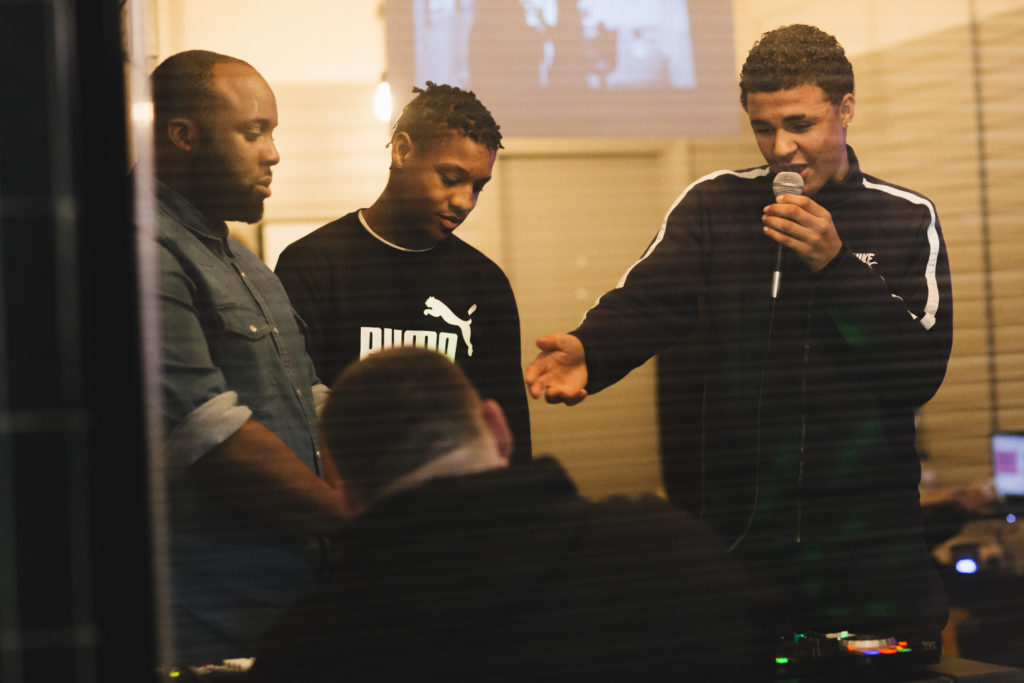
Far more than just safe environments where young people can report and receive support for any safeguarding risks, however, Art Against Knives’ spaces are empowering and inspiring, allowing for the exploration of aspiration and the development of skills. The organisation views young people not as victims but as resilient, ambitious creative professionals in their own right, with limitless potential to be tapped into. From zine-making to nail art and podcast producing, there are opportunities at Art Against Knives for young people to practice their creativity. Said opportunities are not merely tokenistic, furthermore; there is a genuine attempt to offer infrastructure and connection to industry: the training that budding nail technicians can receive through the In Our Hands programme is accredited, for example, leading to a Level 1 qualification and viable routes to employment. Former participants have gone on to be employed within Art Against Knives’ nail bars. The organisation’s work has rightfully begun to receive recognition from corporations in the creative space, with historical support from Universal Music and a present partnership with Apple in support of the ‘One Mic Real Talk’ podcast led by young people.
That such facilities continue to exist where young people can experiment with various art forms and gain experience in creative environments like recording studios can only be celebratory. This spirit of celebration and embracing talent was epitomised at the awards ceremony at Art Against Knives’ 10th birthday event, which followed performances including Rap and Dancehall songs and contemporary dance routines. “I don’t think I’d be making music seriously if not for visiting The Lab every week”, said one young person during their acceptance speech after being voted best musician. “Without these lot, I’d probably be on the high road doing…”, they continued before their voice trailed off reflectively. Rather than the unspecified, likely unsavoury activities they alluded to, this young person is instead safe and healthy, presently thriving in further education while also contemplating pursuing a career in entertainment.
Young people themselves corroborate that the early intervention offered by organisations such as Art Against Knives is critical. Art forms such as music and proliferating mediums like podcasting stimulate the collective imagination and become frontiers on which resistance is waged against injustice and inequity. Rather than scapegoating newly emerging genres like Drill for issues like violence that have long existed, does it not serve us much better to embrace creativity as a tool for social impact?
We need your support! Art Against Knives youth space in North London is at risk of closing. It provides over 400 young people a year with a place to imagine, learn & create their own positive futures, free from violence. Today we are launching a crowdfunder to save our space! Please donate and share widely: https://www.spacehive.com/artagainstknives.
Contribution by Franklyn Addo.
Check out the GUAP Arts & Culture section, to discover new art, film, and creative individuals.





![ZINO VINCI’S ‘FILTHY & DISGUSTING’EP BRINGS YOU TO THE CORE OF THE ARTIST [@ZinoVinci]](https://guap.co/wp-content/uploads/2023/10/Zino-4.jpg)

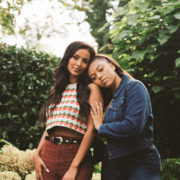
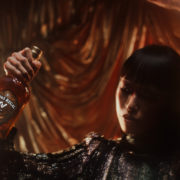


![Remel London’s [@Remel_London] “Mainstream” is a must attend for upcoming presenters!](https://guap.co/wp-content/uploads/2017/02/REMEL-LONDON-FLYER-FINAL-YELLOW-COMPLETE-1.png)